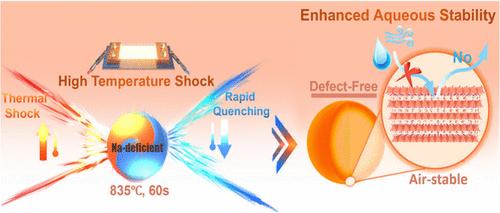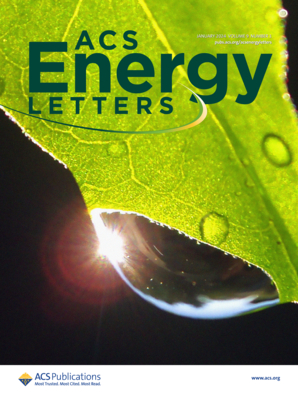通过超快合成解锁无缺陷钠离子层状氧化物阴极的空气稳定性
IF 18.2
1区 材料科学
Q1 CHEMISTRY, PHYSICAL
引用次数: 0
摘要
钠离子电池(sib)用o3型阴极的工业化受到严重空气敏感性的严重脆弱性的阻碍,这种脆弱性在暴露后会导致不可逆的结构退化和性能衰减。在这里,我们采用了一个由动力学控制控制的高温冲击(HTS)合成过程(>800°C s-1)。这种超快方法抑制了杂质(如Na/Ni反位和NiO相)的形成,产生了几乎没有缺陷的片层框架。所得到的材料由于其晶格的完整性而表现出内在的空气稳定性。这种固有的稳定性可以防止腐蚀而不需要外在的修饰,即使在直接浸入水中也能保持电化学性能。因此,这使得低成本,环保的水电极处理成为可能。该材料在1500次循环后,以2C的速率保持约70%的容量,突出了HTS策略作为可扩展制造空气稳定阴极的广泛适用途径。本文章由计算机程序翻译,如有差异,请以英文原文为准。

Unlocking Air Stability in Defect-Free Na-Ion Layered Oxide Cathodes via Ultrafast Synthesis
The industrialization of O3-type cathodes for sodium-ion batteries (SIBs) is hindered by a critical vulnerability─severe air sensitivity, which causes irreversible structural degradation and performance decay upon exposure. Herein, we employ a high-temperature shock (HTS) synthesis process (>800 °C s–1) governed by kinetic control. This ultrafast method suppresses the formation of impurities (like Na/Ni anti-sites and NiO phases), yielding a nearly defect-free lamellar framework. The resulting material exhibits intrinsic air stability stemming from its lattice integrity. This inherent stability prevents corrosion without extrinsic modifications, demonstrated by its retention of electrochemical performance even after direct water immersion. Consequently, this enables low-cost, environmentally benign aqueous electrode processing. The material retains approximately 70% of its capacity after 1500 cycles at a 2C rate, highlighting the HTS strategy as a broadly applicable pathway for the scalable manufacturing of air-stable cathodes.
求助全文
通过发布文献求助,成功后即可免费获取论文全文。
去求助
来源期刊

ACS Energy Letters
Energy-Renewable Energy, Sustainability and the Environment
CiteScore
31.20
自引率
5.00%
发文量
469
审稿时长
1 months
期刊介绍:
ACS Energy Letters is a monthly journal that publishes papers reporting new scientific advances in energy research. The journal focuses on topics that are of interest to scientists working in the fundamental and applied sciences. Rapid publication is a central criterion for acceptance, and the journal is known for its quick publication times, with an average of 4-6 weeks from submission to web publication in As Soon As Publishable format.
ACS Energy Letters is ranked as the number one journal in the Web of Science Electrochemistry category. It also ranks within the top 10 journals for Physical Chemistry, Energy & Fuels, and Nanoscience & Nanotechnology.
The journal offers several types of articles, including Letters, Energy Express, Perspectives, Reviews, Editorials, Viewpoints and Energy Focus. Additionally, authors have the option to submit videos that summarize or support the information presented in a Perspective or Review article, which can be highlighted on the journal's website. ACS Energy Letters is abstracted and indexed in Chemical Abstracts Service/SciFinder, EBSCO-summon, PubMed, Web of Science, Scopus and Portico.
 求助内容:
求助内容: 应助结果提醒方式:
应助结果提醒方式:


